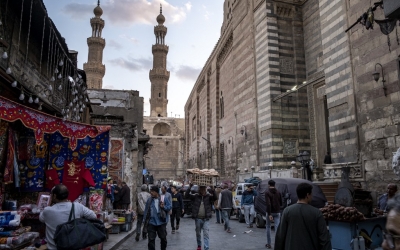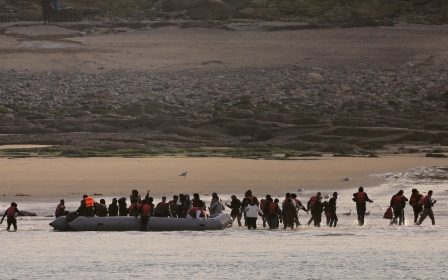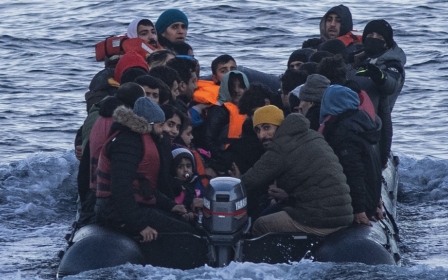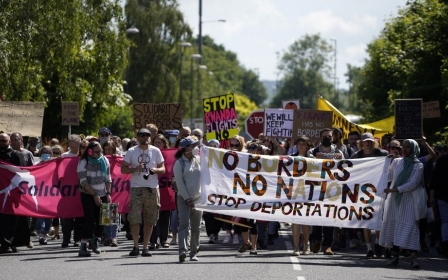Rwanda detainee fates uncertain as cases enter UK asylum system
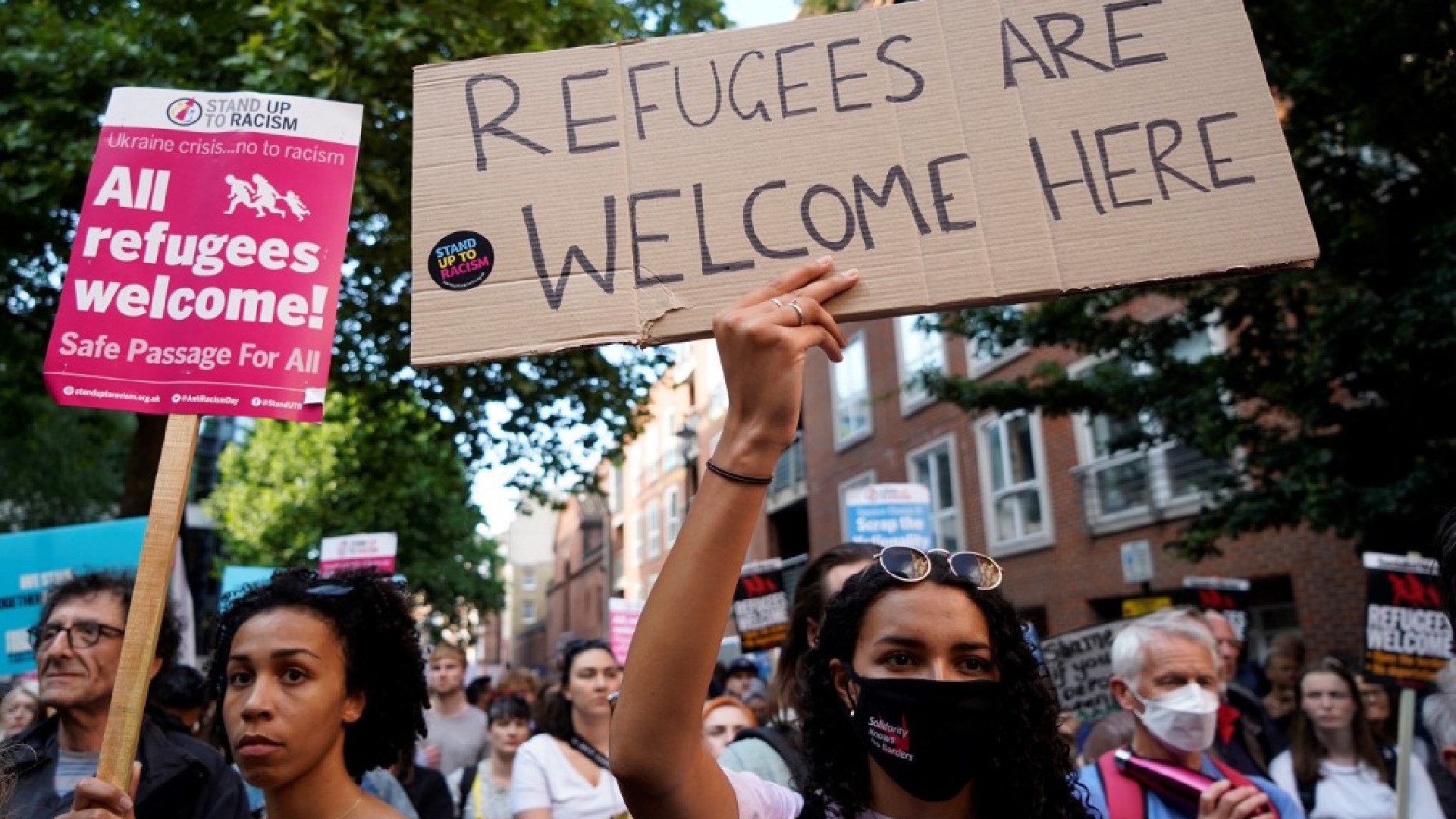
At 7am on 30 April, Omar* awoke to the sound of immigration officers banging on his apartment door in Warrington in northern England.
The early morning raid brought back memories of life in Egypt, which he fled for the UK more than two years ago.
“I hid in the bathroom and locked the door. I was crying... this happened in Egypt,” he said, his voice shaking as he took deep breaths.
“I thought they were going to send me back,” he said.
In terror, Omar jumped out of the window, and tried to flee over the roof, but he was caught and taken away in handcuffs.
New MEE newsletter: Jerusalem Dispatch
Sign up to get the latest insights and analysis on Israel-Palestine, alongside Turkey Unpacked and other MEE newsletters
Omar suffered imprisonment and torture in Egypt and is one of more than 200 people who were detained with view to deportation to Rwanda, as part of former Prime Minister Rishi Sunak’s flagship scheme.
Following a two-year battle between the Commons and the Lords, the Rwanda deportation bill became law on 23 April.
Shortly after, scores of people were rounded up at reporting centres and asylum accommodation, bundled into vans and thrown into detention, with Sunak confirming that flights would depart in the first weeks of July.
In May, Sunak said that the deportation flights would not leave for Kigali until after the general election on 4 July, prompting the release of almost all detainees earmarked for the scheme, including Omar.
On his first day in office, Prime Minister Keir Starmer pronounced the scheme “dead and buried,” and on 18 July, the government removed “inadmissibility” conditions, effectively admitting 90,000 people into the UK asylum system for their claims to be processed.
In place of the shelved policy, the new government’s border security, asylum and immigration bill, outlined in the King’s Speech on 14 July, pledges to “fast-track returns for individuals coming from safe countries”.
Omar has had his claim admitted to the UK asylum system, but he will have to convince the Home Office of his account of torture in Egyptian detention.
He is one of many asylum seekers earmarked for deportation who have a question mark hanging over their fate.
Tortured in detention
The raid Omar experienced in Warrington closely mirrored an earlier experience in Egypt, where security forces broke into his home at 2am in January 2022 and detained him in front of his mother and sisters.
Omar was arrested for participating in protests against evictions on Warraq island on the Nile river, where the authorities earmarked over 2,000 homes for demolition to pave the way for Manhattan-style residential towers.
Omar was handcuffed and blindfolded, and taken to Qanater El Khairia, a prison on the outskirts of Cairo. Throughout his four-month detention, Omar endured daily beatings with a metal bar. Each beating lasted for around three hours.
He was briefly released when a solicitor secured his bail, but was detained again just a week later after he refused an offer by the authorities to exchange a flat for his home.
This time the torture was even more horrific. In one episode, he was beaten by seven officers for five hours. One of them slashed his neck with a knife. On two occasions, Omar was stripped naked and repeatedly raped with a metal object for around two hours. In another instance, his toenails were extracted.
Omar’s medical report detailed a scar on his neck, burns on his leg, a linear scar over his ankle and missing toe nails on his fourth and fifth toes.
The solicitor again managed to secure his release. Shortly after, in August 2022, Omar fled the country. He was smuggled over the border to Libya, where he was held in a warehouse by a smuggler ring, along with around 40 other people.
He recalled that they were repeatedly beaten and shot at if they tried to escape.
“People were suffering from the catastrophic health situation there, some had broken legs and hands, and others had injuries from being beaten or shot for trying to escape,” Omar told MEE.
After 10 days, he boarded an overcrowded dinghy to cross the central Mediterranean to Italy.
Omar was still badly injured from his time in prison, he struggled to walk and required medical attention.
He found sparse support in Italy. Unable to speak Italian, he struggled to access medical care, and wound up on the streets due to lengthy waiting lists for accommodation.
He was advised to go to France so he could access better medical care, in September he took the train from Milan to Paris.
There, he once again found himself on the streets.
A stranger advised him to cross the channel to the UK. “I was told they would care about me there,” he said.
A friend in Egypt wired him the money for his passage. Omar spent a grim two weeks in a tent in Calais, during which he attempted three journeys across the perilous channel crossing. His first journey was aborted after they were apprehended by the French police who fired tear gas at them.
"I was with women and children and I was not able to run from the police because of my injuries," Omar said.
During the second journey, Omar said he "nearly drowned" as the French police attacked the dinghy he was in.
The third trip, on 14 November 2022 was successful. He recalled that the overstuffed boat was carrying around 90 people, including many children and elderly people.
"The more we sailed, the waves became stronger and more ferocious...I cried a lot on this trip. I felt that it was my last," Omar said.
Upon arrival in the UK he was taken to a detention centre, and then shifted between a series of hotels, finally ending up in a shared flat in Warrington. That is where the immigration officers detained him in April 2023.
A victim of state violence
Omar was taken in handcuffs to a detention holding centre in Runcorn, where he had his phone confiscated and was presented with a document which he refused to sign. He alleges that his requests for a translator and lawyer were all declined.
When immigration officers threatened to call the Egyptian embassy to arrange his return to Egypt, Omar suffered a seizure.
“He had a post-traumatic stress disorder seizure, obviously he's a repeat victim of state violence,” Omar’s solicitor, Laura Smith of the Joint Council for the Welfare of Migrants (JCWI) told MEE.
“All the Home Office records call it a behavioural seizure… I raised this with a psychologist who said this is a term that should not be used, as it is considered to minimise non-epileptic seizures when they are still very real.
“They’re treating him like he’s hysterical or doing it for effect," she said. “Which isn't the case at all, is very legitimate. It's just triggered by trauma.”
Omar was taken to hospital, and then swiftly returned to the holding centre.
'He had a post-traumatic stress disorder seizure, obviously he's a repeat victim of state violence'
- Laura Smith, Joint Council for the Welfare of Migrants (JCWI) solicitor
He was held there for two days. He was then taken to Brooke House in London - en route he suffered another seizure and was transferred to an ambulance for treatment. He was then handcuffed and put back in the van and driven to the detention centre.
“He couldn’t even speak to me when I was trying to ask him about himself,” Smith said.
MEE reached out to the Home Office, who said they did not recognise Omar’s claims.
“We take the welfare of individuals in our care extremely seriously, and there are robust safeguarding measures in place to ensure everyone is treated with dignity and has access to the support they need, including food and legal aid,” a Home Office spokesperson said.
Middle of nowhere
Another detainee, Ahmed*, fled Damascus in February 2022, taking a flight to Benghazi with a group of men. From there, they tried to cross the Algerian border but were detained by the police and spent 10 days in prison, until a court ordered their deportation.
“They drove us to the Niger desert, and dropped us in the middle of nowhere, around midnight,” Ahmed told MEE.
“We walked in the desert for around a week, until we reached a main road and found a man who directed us towards the Algerian city of Wahran. We reached the city but we were living in fear of being deported to the desert again or to Syria,” he said.
From there, Ahmed took the boat to Spain, where he was detained. The authorities asked if he wanted to claim asylum there, but he said he wanted to join his brother in the UK, who had moved there five years previously.
He continued his journey via a string of trains and buses to the French border.
“In Calais, we received the worst treatment by authorities, it was almost reminiscent of the Syrian regime,” he said.
He boarded a dinghy to cross the channel on 9 July 2022. The boat was intercepted by the British coastguard and Ahmed was taken to a hotel near Heathrow where his brother met him and registered his address. Ahmed has been living with him for the last two years.
On 1 May 2024, Ahmed arrived to register at the Hounslow immigration reporting centre, as he had been required to do on a monthly basis.
“I have been going to the centre to sign papers for a year and never faced a problem,” he said.
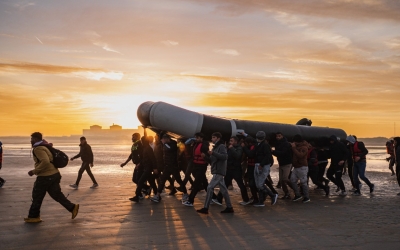
But this time, he was bundled into a van by immigration officers and sent to detention in Brook House.
“They told me you will be deported to Rwanda and there’s no asylum for you here. I felt deeply demoralised,” Ahmed told MEE.
“During detention, I couldn’t stop thinking about my reality, about deportation to Rwanda, the tragedies that we’ve experienced in Syria,” he said, his voice breaking.
He spent a month in detention, before his solicitor secured his release on bail on 24 May.
Both Omar and Ahmed received in-person visits and regular phone calls from immigration officers following their release. The Home Office also increased the frequency of their visits to reporting centres to twice a week.
Omar and Ahmed have both had their cases admitted to the UK asylum system and their interviews scheduled.
According to Smith, who represents both Ahmed and Omar, Ahmed’s application is likely to be more straightforward, as Syrians do not need to be accepted as credible in individual cases.
For Omar, the onus is on him to convince the Home Office of his account of persecution in Egypt.
“He should go through standard process with no presumption of refusal, but the usual issues of Home Office culture of disbelief may mean his case needs to proceed to appeal stage,” Smith told MEE.
While Starmer has shelved the Rwanda scheme, his new borders and immigration bill will accelerate deportations to safe countries. He has also not ruled out processing asylum seekers offshore.
The Refugee Council estimates that of 90,000 asylum claims that Labour plans to fast-track, around 60,000 will be granted asylum, with applicants from designated “safe countries” expected to be rejected.
The UK’s list of safe countries was expanded in November 2023 to include India and Georgia - a Plan B in the event of the failure of the Rwanda policy.
Individuals from “safe” countries of origin face removal to their own country without assessment of their claim, except in exceptional circumstances.
While the Telegraph reported in November that Egypt was also expected to be added to the list, it is not currently designated a “safe country”.
MEE understands that refugee rights campaigners are expecting a revised list in the coming weeks, but the Home Office said they are currently not disclosing an exact list.
*Editor's note: Names have been changed to protect the interviewees
Middle East Eye delivers independent and unrivalled coverage and analysis of the Middle East, North Africa and beyond. To learn more about republishing this content and the associated fees, please fill out this form. More about MEE can be found here.


